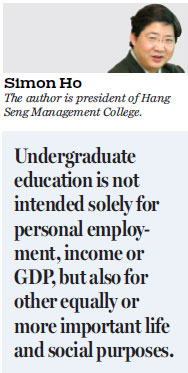Four-year undergraduate education well worth cost
Updated: 2018-02-12 06:30
(HK Edition)
|
|||||||
As higher education becomes more popular worldwide the rising cost of four-year undergraduate education, prolonged stagnant growth of starting salaries for many graduates and failure of many graduates to find employment related to their major studies have led to misunderstandings. Some Hong Kong people believe there are too many university graduates with devalued academic qualifications. These people even encourage candidates with less satisfying Hong Kong Diploma of Secondary Education Examination results to enroll in non-degree vocational programs.
However I believe the notions that "university education is of little use" or "degrees are not worth much" are obviously short-sighted. At present just 20 percent of Hong Kong's workforce holds a bachelor's degree; this lags far behind the 40 percent in most advanced economies. To understand if there are too many university students, we need to see whether undergraduate education is simply to meet employment or manpower needs, or if there are other important life and social purposes.

Of course, the rise in the number of university students in recent years will surely lower the average quality of these students. Nonetheless, all students (only about 35 percent of candidates) admitted to Hong Kong's recognized bachelor's degree programs have attained the minimum DSE requirement to enter universities. Therefore, the quality of university students has been guaranteed in a way. Moreover, the DSE result does not fully represent an individual's overall quality and potential.
For many students and parents, university study can enhance employment prospects, income and social mobility. Undergraduate education can also uplift the overall employment, productivity and economic growth of society. There is nothing wrong with this as much academic research data shows there is a positive correlation between having a bachelor's degree and job advancement and income in the long term. The gap between degree holders' and non-degree holders' salaries grows over time. Starting salaries for many vocational and technical institution graduates are relatively high but degree-holders can switch positions in the employment market much more easily than non-degree holders can, reducing the risk of middle-aged unemployment. Studying a four-year undergraduate program certainly has its market premium.
Obviously, changes in society's demand for talent quality mean a bachelor's degree can no longer guarantee a good job today. In recent years salaries of Hong Kong bachelor's degree graduates have become stagnant, a result of global economic restructuring and many other social, industrial and personal factors. In a severely competitive market, degrees are just entry tickets to the workplace; subsequent successes rely heavily on personal competencies, attitude and performance.
Many degree graduates are humble and willing to start their careers at operational level to gain front-line experience, a good sign as it improves prospects for promotion to management level. The varied knowledge and skills required for work today often do not match the disciplines studied in universities. Even if the first job after graduation is a good fit, graduates may change positions or start their own businesses after a few years. Undergraduate education is to prepare young people for multiple pathways.
The government and business sector have always hoped undergraduate education will be as closely linked to manpower needs and economic development as possible. But undergraduate education is not intended solely for personal employment, income or GDP, but also for other equally or more important life and social purposes. Undergraduate education (especially in liberal arts) aims to nurture individuals with the 21st-century transferable core competencies such as interdisciplinary knowledge, critical thinking, creativity, human caring, moral values and a sense of social responsibility, so they can happily and confidently unleash their utmost potential and meet future challenges in work and life.
For example undergraduate students with majors in humanities and social sciences, regardless of whether they can apply what they have learned in their careers, will have a wider scope of knowledge and fuller lives. They will have a deeper understanding of the world's complex issues. Apart from enhancing individuals' competencies and attributes, undergraduate education can also enhance the quality, equity and harmony of all society.
If we regard undergraduate education as the basic right of a young person with capabilities to pursue, the opportunity to reflect about life, and the responsibility to pass on knowledge and culture, then Hong Kong's enrollment rate of undergraduates is still not high, not to mention the so-called worries such as "academic qualification devaluation" and "excessive supply of university students".
It is understandable that most people in Hong Kong regard non-degree vocational education as a second choice for further education, and expect to move onto bachelor's degree programs. Qualified DSE students should choose vocational education programs (be they degrees or not) or traditional undergraduate programs depending on personal interest rather than simply their DSE result. In Germany, many outstanding high school students apply for study in vocational and technical institutions instead of traditional universities. This is entirely the individual's free choice. However, today's advanced vocational and technical institutions in Europe and the United States have gradually adopted some liberal arts education elements (Hong Kong still lags in this respect) into their previous narrow professional orientation. On the other hand, liberal arts universities have also provided some professional-oriented major programs to fulfill the employment needs of some students.
The cost of quality undergraduate education is indeed high, but as a society's long-term investment, the return is certainly super value for money. The government has already provided tuition fee subsidies to undergraduate students of locally accredited self-financed institutions; together with the institutions' scholarships and bursaries, university education is made affordable for students from the middle and lower-income groups. From the perspective of social equity and mobility, and of pursuing a balanced and happy humanistic society, the number of university students in Hong Kong is still far from sufficient.
(HK Edition 02/12/2018 page13)